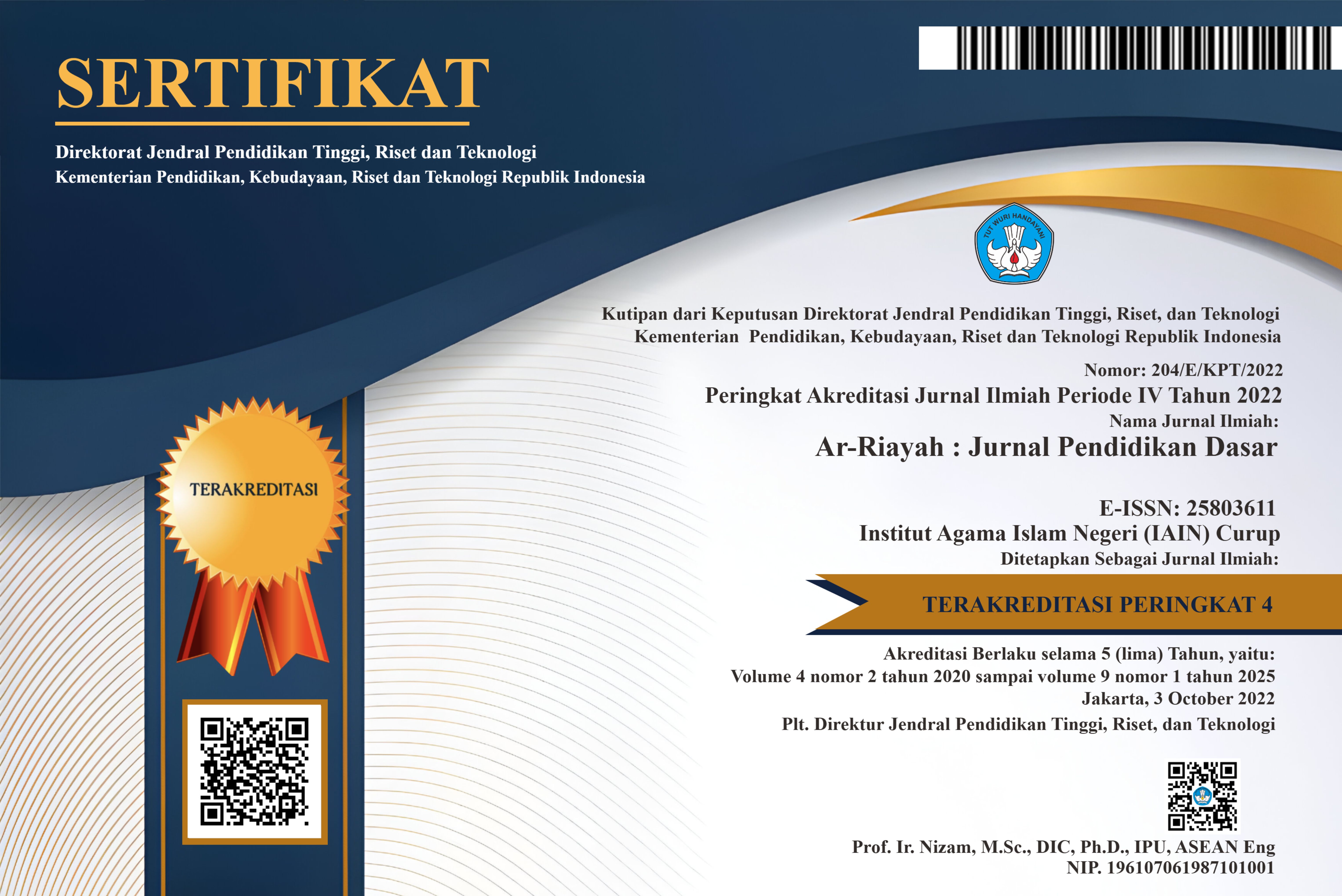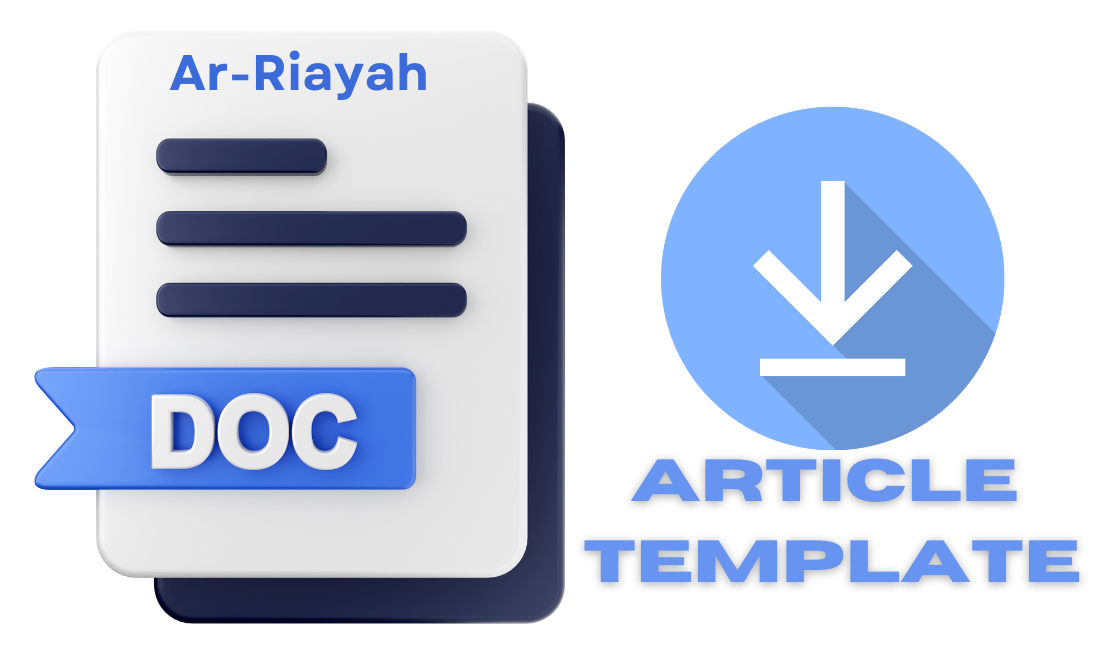Pengaruh Pembelajaran Berbasis Gamifikasi Terhadap Penguasaan Konsep dan Motivasi Siswa pada Materi Siklus Air
DOI:
https://doi.org/10.29240/jpd.v7i2.8116Keywords:
Concept Mastery, Learning Motivation, Gamification, Water CycleAbstract
The aim of this research is to analyze the influence of gamification-based learning with conventional learning on class V students' mastery of concepts. The quasi-experimental method used in this research. Inferential statistical analysis and descriptive statistics using Microsoft Excel 2016 and SPSS version 20 were used for data processing. Sampling used purposive sampling technique with 31 students from class V-A control class and 33 students from class V-B experimental class. Research findings show that gamification-based learning has a positive effect on students' concept mastery and motivation. Students' mastery of concepts increased from an average score of 56.991 to 80.191. Students' learning motivation after applying gamification-based learning did not increase. The t-test results obtained were sig. = 0.593 ≥ 0.05. Gamification-based learning has a better effect on students' mastery of concepts compared to conventional learning as seen from the t-test results with an average in the experimental class of 80.358 > 72.97 in the control class.
Downloads
References
Arikunto, Suharsimi. Prosedur penelitian suatu pendekatan praktik. Jakarta: Rineka Cipta, 2006.
Emda, Amna. “Kedudukan Motivasi Belajar Siswa dalam Pembelajaran.†Lantanida Journal 5, no. 2 (15 Maret 2018): 172. https://doi.org/10.22373/lj.v5i2.2838.
Febryana, Noor Eka, dan Zubaidah Zubaidah. “Implementasi Media Asesmen Berbasis Gamifikasi terhadap Motivasi Belajar Biologi Siswa MAN Kotawaringin Timur.†Jurnal Penelitian Sains dan Pendidikan (JPSP) 2, no. 2 (31 Oktober 2022): 159–67. https://doi.org/10.23971/jpsp.v2i2.4009.
Hamdu, Ghullam, dan Lisa Agustina. “Pengaruh motivasi belajar siswa terhadap prestasi belajar IPA di sekolah dasar.†Jurnal penelitian pendidikan 12, no. 1 (2011): 90–96.
Kumullah, Rahmah, Ery Tri Djatmika, dan Lia Yuliati. “Kemampuan Berpikir Kritis dan Penguasaan Konsep Siswa dengan Problem Based Learning pada Materi Sifat Cahaya.†Jurnal Pendidikan: Teori, Penelitian, dan Pengembangan 3, no. 12 (2018): 1583–86. http://journal.um.ac.id/index.php/jptpp/article/view/11798.
Kusuma, Gede Putra, Evan Kristia Wigati, Yesun Utomo, dan Louis Khrisna Putera Suryapranata. “Analysis of Gamification Models in Education Using MDA Framework.†Procedia Computer Science 135 (2018): 385–92. https://doi.org/10.1016/j.procs.2018.08.187.
Kusumawati, Oktaria. “Pengaruh Permainan Tradisional Terhadap Peningkatan Kemampuan Gerak Dasar Siswa Sekolah Dasar Kelas Bawah.†Jurnal Pendidikan dan Pembelajaran Dasar 4, no. 2 (2017): 124–42. https://doi.org/10.24042/terampil.v4i2.2221.
Monika, Monika, dan Adman Adman. “Peran Efikasi Diri dan Motivasi Belajar dalam Meningkatkan Hasil Belajar Siswa Sekolah Menengah Kejuruan.†Jurnal Pendidikan Manajemen Perkantoran 2, no. 2 (31 Agustus 2017): 109. https://doi.org/10.17509/jpm.v2i2.8111.
Oktaviani, Widya, Gunawan Gunawan, dan Sutrio Sutrio. “Pengembangan Bahan Ajar Fisika Kontekstual Untuk Meningkatkan Penguasaan Konsep Siswa.†Jurnal Pendidikan Fisika dan Teknologi 3, no. 1 (18 Juni 2017): 1–7. https://doi.org/10.29303/jpft.v3i1.320.
Park, Hee Jung, dan Jae Hwan Bae. “Study and Research of Gamification Design.†International Journal of Software Engineering and Its Applications 8, no. 8 (2014): 19–28. https://www.earticle.net/Article/A230680.
Prihatini, Nirmala. “Analisis Berbagai Faktor Penyebab Rendahnya Motivasi Belajar Siswa Kelas IV SDN 3 Tebaban.†Jurnal DIDIKA: Wahana Ilmiah Pendidikan Dasar 4, no. 1 (29 Juni 2018): 56. https://doi.org/10.29408/didika.v4i1.1198.
Rahmah, Siti, Lia Yuliati, dan Edy Bambang Irawan. “Penguasaan Konsep IPA pada Siswa Sekolah Dasar.†Prosiding Seminar Nasional PS2DMP ULM 3, no. 1 (2017). https://rumahjurnal.net/index.php/PS2DMP/article/view/207.
Setiyawan, Muhammad, Wing Wahyu Winarno, dan Andi Sunyoto. “Implementasi Gamification pada Aplikasi Perkuliahan Mahasiswa dengan Metode Feature Driven Development (Studi Kasus: AMIK Cipta Darma Surakarta).†Jurnal Ilmiah IT CIDA 5, no. 1 (30 Juli 2019). https://doi.org/10.55635/jic.v5i1.87.
Solviana, Meita Dwi. “Pemanfaatan Teknologi Pendidikan di Masa Pandemi Covid-19: Penggunaan Fitur Gamifikasi Daring di Universitas Muhammadiyah Pringsewu Lampung.†Al-Jahiz: Journal of Biology Education Research 1, no. 1 (2020). https://doi.org/10.32332/al-jahiz.v1i1.2082.
Sugiyono. Metode penelitian pendidikan pendekatan kuantitatif, kualitatif dan R&D. Bandung: Alfabeta, 2016.
Sujana, Atep. Dasar-Dasar IPA: Konsep dan Aplikasinya. Bandung: UPI Press, 2014.
Susanti. “Efektifitas Gamifikasi Sliding Puzzle pada Pembelajaran E-Learning Terhadap Motivasi dan Hasil Belajar IPA.†SPEKTRA: Jurnal Kajian Pendidikan Sains 7, no. 1 (2021): 57–67. http://dx.doi.org/10.32699/spektra.v7i1.178.
Downloads
Published
How to Cite
Issue
Section
Citation Check
License
Authors who publish with Ar-Riayah: Jurnal Pendidikan Dasar agree to the following terms:
Authors retain copyright and grant the journal right of first publication with the work simultaneously licensed under a Creative Commons Attribution-NonCommercial-ShareAlike 4.0 International License (CC BY-NC-SA 4.0) that allows others to share the work with an acknowledgment of the work's authorship and initial publication in this journal.
Authors are able to enter into separate, additional contractual arrangements for the non-exclusive distribution of the journal's published version of the work (e.g., post it to an institutional repository or publish it in a book), with an acknowledgment of its initial publication in this journal.
- Authors are permitted and encouraged to post their work online (e.g., in institutional repositories or on their website) prior to and during the submission process, as it can lead to productive exchanges, as well as earlier and greater citation of published work (See The Effect of Open Access).










